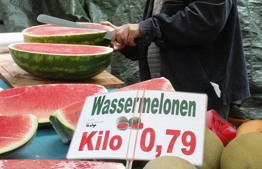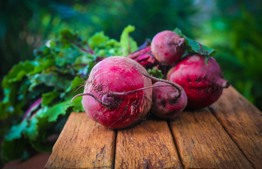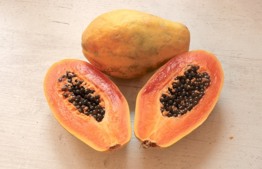Orlah, Appendix: Fruit in the Marketplace - Review

Can we be sure we’re not buying orlah fruit in the supermarket? In the shuk? A review of the kashrut practices employed in the field and sectors where orlah fruit can be an issue.
Rabbi Yoel Friedemann
Foreword
The following survey was published as an appendix to the article "Purchasing fruit in the marketplace without kashrut supervision" in Emunat Itecha, 84 (5770, 2010), pp. 32–42. While the survey was from 5770, the situation in the field and common work practices are still relevant today (Elul 5778, September 2018) perhaps with some minor changes. This survey can gives us a general picture of the sales methods and especially of the problem or orlah in the marketplace. Of course, things can change in the future, and such changes will have to be taken into consideration.
To clarify the practical aspects of selling fruit in the State of Israel, and to understand how the kashrut supervision system prevents sales of orlah fruit, we met with agronomist Michael Kurzwiel (the Division of Land-Related Mitzvot, Chief Rabbinate of Israel) and Rabbi Haim Dagan (Kashrut Division, Chief Rabbinate of Israel). Below is a report from the meeting.
Survey
The lists compiled by Dr. Moshe Sachs of the Unit for Agriculture According to the Torah[1] include data on the percentage of orlah in Israel's open markets, based on the number of various fruit trees planted in Israel. Note that there is no one organization in Israel with precise data on tree planting, in terms of both quantity and location. While many years ago the Fruit Council and the Citrus Council were in charge of tree planting in Israel, today any farmer who wants to plant orchards or groves can do as they please. The only organization that has relatively current data is the Chief Rabbinate of Israel. The rabbinate's kashrut supervision system covers most of the agricultural areas in Israel, including many types of fruit trees, and has data about trees planted, including space-filling trees. The situation is such that when the Israel Fruit Growers' Association wants to guide and regulate tree planting, it requests data from the rabbinate's database.
There is a difference between citrus trees and other fruit trees. Citrus fruit is not sold directly to markets due to possible defects; all fruit first goes to packaging houses, which means that the rabbinate has complete control of the situation. There is comprehensive supervision of the orchards, and packaging houses only receive citrus fruit approved by the chief rabbinate. It would be difficult for orlah fruit to reach to marketplaces without first passing through these packaging houses. Even if this were to occur, it would be noticeable since the fruit would not be waxed. So it is safe to say that citrus fruit in the marketplace is orlah-free.
As for other fruit—summer fruit, deciduous fruit, etc.—supervision is laxer than for their citrus counterparts. The reason for this is that these fruits do not necessarily go through the packaging houses; farmers also sell fruit directly to local markets. Note, however, that throughout Israel the rabbinate supervision system for these types of fruits, as well, is excellent and extremely efficient. Every year supervision continues to improve thanks to the growing awareness among consumers, the local rabbinates, and as a result, the farmers as well. The last mentioned have learned that it pays for them to have orlah supervision, since failing to do so would significantly undermine the marketability of their produce.
Those who do not have kashrut supervision from the chief rabbinate cannot sell to supermarket chains or the IDF. The only alternative is to sell directly to the wholesale markets.
Today the fresh produce sales system in Israel is split between the major supermarket chains, which account for approximately 70% of fruit sales, and the open markets, which receive the remaining 30% (approx.) of the produce. There is a whole set of supermarket chains and wholesale distributors that work with them, which include: Shufersal, Coop , Bikurei HaSade Darom, Bikurei HaSade Tzafon, Abargel Bros., and Azulay, among others. These major companies, which have centralized warehouses, distribute fruits and vegetables to all of the supermarket chains and the IDF. These systems have a centralized supervision system; no supermarket chain can purchase fruits or vegetables that have not first passed through the warehouses that work with their supermarket.
The Chief Rabbinate's kashrut supervision system includes three agronomists who are rabbinate employees, and another fifteen independent agronomists and kashrut supervisors who work in the field checking and supervising farmland throughout Israel, paid directly by the farmers (against invoices). As stated above, the growing awareness among farmers that they cannot sell their produce to large supermarket chains without rabbinate certification stating that their fruit is not orlah motivates farmers to pay independently for kashrut supervision. The supervisors inspect the orchards, ensure that any orlah fruit is removed from the trees in the beginning of their growth, and only after this point does the farmer receive this certification. Farmer deception, where certified farmers sell the fruit of uncertified farmers, is extremely marginal; certified farmers sign a contract and legal forms stating that such cases of fraud will make them liable for administrative fines and kashrut certification will be nullified for all orchards and groves in their ownership for five years.
All kashrut supervision agencies in Israel, Badatz and others, rely on these kashrut supervisors and on the Chief Rabbinate's agronomists to check the fields and orchards for produce sales through their kashrut agency. Furthermore, by law they cannot provide kashrut certification independently without a rabbinate certification; doing so constitutes a breach of the Kashrut Fraud Law. At every store with a kashrut certificate (green grocers, supermarkets, booths at the shuk, restaurants, etc.), part of the mashgiach's job is to check that all of the fruit arrive with a verification that they are not orlah.
In light of all of the above, the data presented by Dr. Moshe Sachs, gathered from tree planting data (received from the Chief Rabbinate) can provide a certain indication of the percentage of orlah fruit. However, this data is far from precise, so we cannot rely on them for practical halacha,[2] for the following reasons:
- The data do not take into consideration the rabbinate supervision system, which ensures that orlah fruit is removed from all supervised areas.
- The data do not take into consideration that some of these trees are planted together with their clod of dirt with a mashgiach's supervision after growing for two years, and their orlah year calculation includes the years in the nursery.
- As we stated earlier, all the problems with orlah are specifically in the free markets. All orlah fruit that cannot reach supermarket chains or the IDF is sold directly to the small markets.
- The above data presents trees with orlah status, but do not reflect the amount of orlah fruit actually reaches the markets.
There are another two points that are worth considering when determining the halacha and making a decision regarding purchasing fruit in the open markets that do not have any kashrut supervision:
- The price the customer pays for the fruits and vegetables is not necessarily higher in supermarket chains than in small markets; often the major supermarket chains lower prices and sell at a loss to attract customers to buy from the rest of their products.
- The Chief Rabbinate kashrut supervision system has made huge strides in recent years, leading to a sharp decline in orlah fruit circulation in the marketplace in general. While this is, in part, due to the kashrut supervision system, it is largely thanks to the public awareness on the part of the end-consumers, who do not want to buy orlah As stated above, this awareness is what drives more and more farmers to request supervision, even though this supervision is at a cost, since they know it is economically worthwhile. On the other hand, when determining the halacha, we have to consider that a blanket heter to purchase fruit in places without kashrut supervision will bring us back to the situation as it was years ago, and may bring with it a decrease in public awareness on the issue.
In Conclusion
We believe that the public should optimally purchase fruit only in places with kashrut certification, which will in turn strengthen the orlah supervision system, rather than relying on leniencies or on Dr. Sach's lists. After-the-fact and in situations of great need (sha'at hadechak), one may rely on these lists, while taking proper precautions.
[1] These lists are published annually in the pamphlet Halichot Sade (Hebrew), see here and posted on the website of the Beit Midrash for Halachah and Agricultural Settlements – Emunat Ish.
[2] See Rabbi Yoel Friedemann: "Summer fruit in the marketplace and reliance on orlah percentage lists," Emunat Itecha 101 (5774, 2014), pp. 37-39 (Hebrew).




